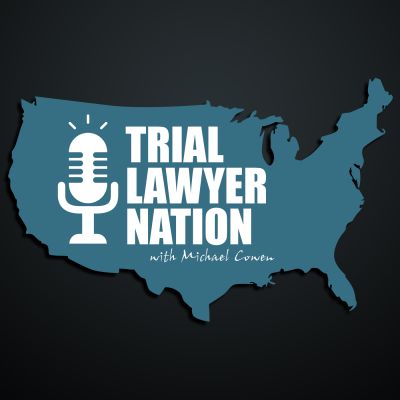Michael Cowen, and his guests, explore critical topics distinctive to the legal profession - specifically focusing on developing extremely efficient law practices, securing a competitive edge in the industry, and wildly excelling in the courtroom.
https://triallawyernation.com/
41 – Malorie Peacock – Resources, Doctor Referrals, and Process-based Focus
In this episode of Trial Lawyer Nation, Michael Cowen sits down with Cowen | Rodriguez | Peacock partner, Malorie Peacock, for another TLN Table Talk to answer the questions of our listeners. This episode focuses on resources for trial lawyers, doctor referrals, and the process behind highlighting what’s most important to your case.
The first question brought to the table is about what the best resources for newer lawyers starting out in the personal injury trial lawyer world. Michael notes his favorite books today would likely not be his favorites for someone just starting out. Having said that, he recommends starting with books like the AAJ Deposition book by Phillip Miller and Paul Scoptur, pointing to the reality in which 90% of cases are likely going to settle and this book focuses on taking good depositions, increasing the likelihood of a higher value settlement for your clients. He also recommends David Ball’s book, Damages 3, which breaks down how to argue a case in a logical and coherent format, avoiding holes in your story, as well as Rules of the Road by Rick Friedman and Patrick Malone, that focuses on simplifying cases. As a follow up to reading all these great books which are meant to help simplify cases, Malorie poses the question of why it is important for lawyers just out of law school (where everything is so complex) to make the transition to presenting to a jury where you have to make things simple, and why it is so difficult. Michael explores this idea and feels that it takes a lot more work to make things simple, and the complexity is what we hide behind to mask our own insecurities. They both agree that complexity and confusion are great defense tools and by presenting a bunch of confusing ideas to a jury could end up playing right into the defense’s hands. To top off the discussion about resources, Michael adds several other courses, trial colleges, information exchange groups, and other programs that are offered and can help lay the foundation for up and coming trial attorneys and also suggests choosing an area to really focus on, since no one can really know everything about everything.
Beyond books and seminars, Malorie brings up the idea of going to trials and second chairing trials as another great way to gain real life learning experiences. Michael also describes his approach to pairing up attorneys with each other based on where they are in their career to gain practical experience in the courtroom. It’s also noted, in cases where your might be trying them on your own, it can still be beneficial to bring in other attorneys who have done what you are about to do, to strategize and help you prepare. Malorie talks about a specific instance of this coming up for her, where she plans to help a friend through voir dire in their upcoming case. Michael also reminisces about several times back in his early days, enticing friends to come over and practice voir dire and openings with pizza and beer in exchange for their feedback. Although, these weren’t professionals or experts, this practice did help him get more comfortable with talking to people while getting useful feedback.
Another question from our listeners is about lawyers referring people to doctors and the perceived issue that the people getting referred are not actually injured but are being sent to a doctor who will work up some medical documentation to make them look like they’ve sustained an injury in order to make more money for the lawyer. Michael describes his personal experience with this issue in that, he faces it head on and is upfront about it, thereby avoiding any awkwardness or perceived deviance on his part. For him, it basically boils down to having a client in pain, who asks for advice on what doctor to go see. They’re not sure what doctor to go see. They don’t know any specialists in this area. What should I do? Most people would say, tell them to go see a doctor and give them a name.
